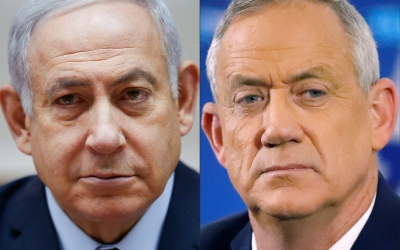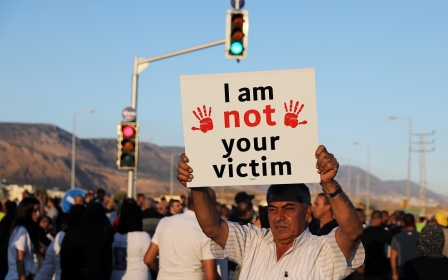King Bibi: The ruler who lost his kingdom

King Bibi: that’s what a Time magazine cover story called Benjamin Netanyahu in July 2012. He and his supporters love to quote it, and frequently do. Netanyahu subsequently won two very tough elections, in 2013 and in 2015, cementing the impression globally - and especially in Israel - that he would stay in office as long as he chose. Just like a king.
After two elections in rapid sequence this year, however, Netanyahu looks more like a king who, having lost his kingdom, barricades himself in his palace rather than admit defeat.
'After losing two elections this year, Netanyahu looks more like a king who, having lost his kingdom, barricades himself in his palace rather than admit defeat'
Netanyahu’s centrality to Israeli politics, enormously amplified after an uninterrupted decade under his rule, made one question - “Netanyahu, yes or no?” - into the central issue for the two elections this year.
In April, Netanyahu approached the first election with the aura of an invincible politician supported by a united right-wing political camp. The Israeli media portrayed him as a global leader who had allied himself with not just the greatest pro-Israel US president ever, Donald Trump, but also with Russian President Vladimir Putin and Saudi Crown Prince Mohammed bin Salman, with recently elected Brazilian President Jair Bolsonaro and leaders of Eastern European states like Hungary and Poland.
In brief, his victory appeared assured.
New MEE newsletter: Jerusalem Dispatch
Sign up to get the latest insights and analysis on Israel-Palestine, alongside Turkey Unpacked and other MEE newsletters
But that’s not what happened. True, Netanyahu did celebrate victory on election night in April, but the festivities were premature. The right-wing bloc lost seats, from 67 in 2015 to 65 in April 2019 out of 120 total. But more importantly, the bloc lost its cohesion.
Everything falls apart
Avigdor Lieberman, the hardline right-wing politician who heads Israel Beiteinu - whose voters are mostly secular immigrants from the former Soviet Union – demanded that Netanyahu unbind himself from the ultra-Orthodox parties in his right-wing coalition.
Without Lieberman, Netanyahu would have lacked a Knesset majority. Yet he refused to give in to Lieberman, in part because the Haredi parties commanded 16 seats, a quarter of those held by his right-wing bloc.
Instead, Netanyahu dissolved parliament and called for a new election within five months. It was the shortest parliamentary term in Israel’s history: a clear sign of political instability.
Netanyahu apparently believed that in the September election rerun, the rightist bloc he heads would receive a Knesset majority even without Lieberman. He had reason to suppose so.
In the April vote, two very right-wing parties – Naftali Bennett and Ayelet Shaked’s New Right and Moshe Feiglin’s Zehut – together received about 250,000 votes but failed to pass the entry threshold of 3.25 percent of votes cast. Since the two parties had decided not to run independently for the September rerun, Netanyahu apparently assumed that most of their votes would go to right-wing parties, thereby guaranteeing another Netanyahu regime.
But no. What happened was just the opposite. Although Likud swallowed the two small parties (Zehut and Moshe Kahlon's Kulanu), the voters gave the party only 32 seats this time around, not 35. Overall, the support of right-wing parties backing Netanyahu dropped from 60 to 55 seats.
And after a campaign featuring direct attacks on Netanyahu - and especially on his Haredi partners and even on his more moderately religious right-wing partners - Lieberman almost doubled his mandate this time around.
Blue and White, which is not so much a party but more a loose coalition of existing parties and ad hoc groups whose leaders mainly share a desire to see Netanyahu ousted from office, managed against all expectations to hold on to its strength.
And Palestinian citizens of Israel, a much higher percentage of whom went to the polls this time around, voted almost exclusively for the Joint (mostly Arab) List, giving it 13 seats. That's a third more than the parties representing this constituency received in April.
So no celebrations this time around by Netanyahu. Even his most loyal supporters saw clearly that he had lost.
Under normal circumstances, since neither Netanyahu nor his opponent Gantz attained a Knesset majority, Israel would now have a unity government under Gantz.
His Blue and White party has more Knesset seats – 33 to the Likud’s 32. Further, the bloc led by Blue and White, which includes Labor, the Democratic Union and the Joint List, is unwilling to serve under Netanyahu and is larger than the bloc supporting Netanyahu – 57 versus 55 seats.
But these are not normal circumstances, mainly for one reason: Netanyahu’s legal situation.
Legal mess
Even before the April election, the attorney general had announced his decision to indict Netanyahu, subject to a pre-indictment hearing, in three different cases involving bribery, fraud, and breach of trust. The hearings are now underway, but there is near-unanimity among legal commentators that indictments will ultimately be served, even if for reduced charges and in fewer than three cases.
'Israeli law requires that a cabinet minister who is indicted must resign from government, but doesn't require the same of a prime minister'
Oddly, Israeli law requires that a cabinet minister who is indicted must resign from the government, but does not require the same thing of a prime minister.
In theory, an Israeli prime minister can be brought to trial, found guilty, and even sent to prison, while remaining prime minister. Only after losing a subsequent appeal would he have to be removed from office.
Before the April vote, even before the September vote, Netanyahu believed that if the right-wing bloc won a Knesset majority, he would not need to resign and could manage his legal cases while remaining prime minister.
But his failures in April and in September have made that a very unlikely scenario. Now, to remain as prime minister and dodge his ousting and possibly also the lawsuits, Netanyahu has two possibilities.
He could go first and serve as prime minister in a rotation deal with Blue and White. Or he could announce a third round of elections in the hope that this time luck would be on his side for a win.
Both options seem somewhat tenuous. Blue and White built its campaign around a vow not to join a government headed by Netanyahu if he were indicted. So it is hard to imagine them agreeing that Netanyahu be first to serve as PM in a unity government that includes them.
As for a third election, this is where Netanyahu’s problems are internal. A third election, if held, would take place around February or March of 2020 and, in the interim, it is quite likely that Netanyahu will be indicted.
Many senior Likud figures fear that in such a case, the centre-left will assemble a majority and then Likud will find itself in the opposition. The latest public opinion polls say the same thing, with most people blaming Netanyahu personally for the current political crisis and demanding that he resign if indicted.
The closer we get to the date for a third election, the more likely it becomes that leading Likudniks, and possibly the Haredi parties, will abandon Netanyahu and forge an agreement with Blue and White behind his back. The image of a king losing his kingdom seems especially fitting here.
Point of no return
But the problem is more than personal. What happened in the two elections of 2019 shows us that the right, once seemingly very unified around Netanyahu, is fracturing.
Lieberman, who as noted represents secular immigrants from the former Soviet Union, will not accept a continuing religious monopoly, granted by right-wing governments to the ultra-Orthodox and the Orthodox over marriage and divorce law, public transportation on the Sabbath, LGBTQ+ rights and so forth. Without the Russian immigrants, the right has no majority.
And with regard to the Palestinians, Netanyahu’s political line for a decade now has been to preserve the status quo: maintaining the occupation and expanding the settlements, but without resorting to dramatic steps like officially annexing parts of the West Bank, so as not to create problems for Israel internationally or even domestically.
In the last two months of his current term, as he became increasingly reliant on support from the far-right, he suddenly adopted the discourse of annexation and promised to annex broad swathes of the West Bank.
While it's hard to prove that this is what moved hundreds of thousands of Israelis not to vote for Netanyahu in September, it clearly did not help him. The Jewish Israeli public evidently prefers the status quo to annexation.
Nor is Netanyahu’s situation particularly rosy on the international level. Trump’s domestic problems on the one hand and the way he abandoned the Kurds in Syria, and his apparent willingness to reach a renewed agreement with Iran on the other, have somewhat yanked the rug out from under Netanyahu’s feet with regard to several of his key policies.
Not coincidentally, after having described Israel’s situation during the election campaign as the best it has ever been, Netanyahu warned, as the new Knesset was being sworn in last week, that Israel faces an “enormous security challenge” from Iran and its Middle East allies.
In other words, even if Netanyahu somehow manages to stay in power through 2020 or even longer, it is hard to see how he could sustain the political and diplomatic stability his administration has enjoyed over the last decade.
Room for hope
The only thing Netanyahu really has going for him now is the weakness of the opposing political camp.
Blue and White may have demonstrated more staying power than most of the political pundits predicted, but it still has no clear policy on anything – from the Palestinian question to the economy. The “classic” leftist parties – Labor and the Democratic Union alliance – are weak and going through internal changes.
The only political party making a lively showing today is the Joint List. The subtext of its decision to recommend Gantz as its candidate to form a government, a move adopted only after major argument and the continuing opposition of one of its constituent party lists (Balad), was that the Palestinian Arab public in Israel has decided to become a player in the overall Israeli political arena.
Blue and White missed its chance to exploit the Joint List’s generosity and expressed no official willingness to follow it up with any formal contacts, but Israeli public opinion is already shifting.
For the first time in many years, perhaps even the first time since 1948, some segment of Jewish public opinion in Israel is approaching an understanding that a political partnership with the elected representatives of the Palestinian Arab constituency in Israel is both justified and necessary.
A recent poll showed that opposition among Jewish voters to include "Arab parties" in the government is down from 66 percent to 50 percent.
We have yet to see just what impact the self-confidence displayed by the Joint List and Palestinian citizens of Israel overall will have on the centre-left as a whole. The road ahead is still very long. Blue and White has expressed no intention to end the occupation or make any real changes in the systemic discrimination against Palestinian citizens in Israel.
But the growing difficulties of Netanyahu and Israel’s right-wing, along with the changing trends at the international and regional levels, plus the gradual shift in consciousness among the country’s centre-left, leave room for hope. After a decade of rule by “King Bibi", even that is something.
Middle East Eye delivers independent and unrivalled coverage and analysis of the Middle East, North Africa and beyond. To learn more about republishing this content and the associated fees, please fill out this form. More about MEE can be found here.









